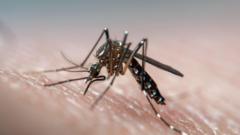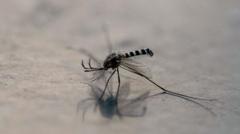Researchers at the University of California, Irvine have developed a novel strategy to combat dangerous mosquito-borne viruses like dengue by genetically modifying male mosquitoes to be unable to hear potential mates, leading to a significant decrease in breeding success.
Deafening Silence: Innovative Genetic Approach to Combat Dengue-Causing Mosquitoes

Deafening Silence: Innovative Genetic Approach to Combat Dengue-Causing Mosquitoes
A groundbreaking method is being explored to tackle mosquito-borne diseases by rendering male mosquitoes deaf, disrupting their mating patterns.
Scientists at the University of California, Irvine have developed a unique strategy to fight diseases spread by mosquitoes, such as dengue and Zika, by genetically modifying male mosquitoes to eliminate their ability to hear. This innovative approach focuses on the Aedes aegypti species, responsible for infecting around 400 million people annually. In their experiments, researchers altered the genetic pathway linked to hearing, specifically targeting a vital protein known as trpVa responsible for sound detection.
The experiment showcased that altered males, despite being housed in the same cage as females for three days, failed to initiate mating due to their deafness, in stark contrast to the wild counterparts that actively copulated. The study suggested that sound plays a crucial role in mosquito mating, with the sensory impairment leading to a complete lack of reproductive success for the deaf males.
Dr. Joerg Albert, a mosquito mating specialist from Germany, recognized the importance of this research, highlighting the new insights into the acoustic dynamics of mosquito reproduction. He emphasized that while this research opens a promising avenue for mosquito control, further study is essential for management and implementation.
The potential of this method could play a significant role in reducing disease transmission. Still, concerns exist regarding the ecological impact, as mosquitoes participate heavily in food chains and pollination processes. The study, published in the journal PNAS, signifies a step forward, suggesting that a combination of strategies, including releasing sterile males, may be key in effectively controlling mosquito populations.





